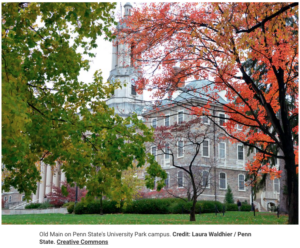UNIVERSITY PARK, Pa. — Penn State ranks No. 38 internationally out of 700 participating institutions in a new sustainability assessment by rankings organization Quacquarelli Symonds (QS). The inaugural rankings, released Oct. 26, provide a framework to show how universities are taking action to tackle the world’s greatest environmental, social and governance challenges.
Penn State is first among Big Ten institutions, No. 6 among public universities in the United States, and No. 14 among all U.S. universities, according to the “QS World University Rankings: Sustainability” assessment.
The global ranking combines two categories — “Environmental Impact,” where Penn State ranked No. 47 in the world, and “Social Impact,” where the University ranked No. 41 — leading to one overall “Sustainability” assessment (No. 38).
Lora Weiss, senior vice president for Research at Penn State, said the new ranking helps demonstrate the University’s true commitment to sustainability, as evident in such initiatives as the Sustainability Institute, the Student Sustainability Advisory Council, and Penn State’s various holistic strategies around diversity, inclusion and equity.
“This ranking reflects Penn State’s core strategies to improve sustainability across many global areas,” said Weiss. “As a land-grant university, we take sustainability seriously at the local, national and global levels, and utilize our magnitude to bring long-lasting advancements to our communities. These passions are ingrained in Penn State’s mission from the top down, and we are proud of the recognition of our efforts.”
Within the Environmental Impact and Social Impact categories, there are “performance lenses” composed of separate indicators. Environmental Impact is focused on sustainable education, institutions and research. Social Impact is focused on employment and opportunities; equity; life quality; impact of education; and knowledge exchange. Each of these categories and “lenses” also has their own, individual ranking. Penn State’s highest individual ranking was in “Sustainable Research” (No. 31 globally) and “Knowledge Exchange (ranked No. 30).
According to Lara Fowler, interim chief sustainability officer and interim director of the Sustainability Institute, Penn State uses a broad definition of sustainability, including both the environmental and social lenses. She noted that “finding ways to expand on the impactful work already happening across the entire University — furthering the land-grant mission with our communities through all 24 of our campuses — in the sustainability space is critical as we seek solutions to the challenges facing us all.”
According to QS, the “World University Ranking: Sustainability” system is based on a framework of environmental, social and governance challenges through research, teaching and community engagement. The organization engages more than 40 world-leading experts across 20 countries on the QS Rankings Advisory Board, and is partnered with Elsevier, Yale University and the Academic Freedom Index regarding data analyses.
For more information about Penn State’s sustainability initiatives, visit sustainability.psu.edu or contact sustainability@psu.edu.
